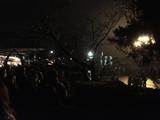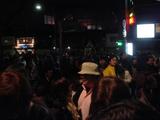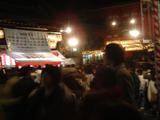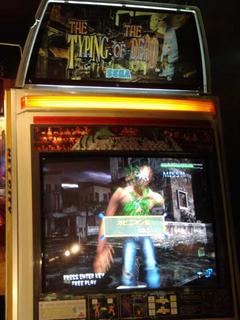"Late good luck."
That's what my omikuji said, according to Mr. Tanaka. Omikuji are little Shinto/Buddhist scrolls that predict your fortune. The neighborhood shrines were beginning to set up for the night's festivities, so we stopped by to buy some. There are at least 16 different possible fortunes, maybe more. You take a metal canister with a tiny hole in the top, and you shake it until one of the sticks inside falls out. You read the number on the stick, and request the corresponding scroll.
So I guess I've got a rosy future ahead of me this year. Eventually.
Suddenly, it was dark. There's no daylight-savings time in Japan, so in the wintertime, sunset's around 4:45pm or so. As we continued to head downtown, the gang patiently allowed me to interrupt our progress every five minutes while I took pictures of the night streets.
Another lonely avenue...
The Tanakas had a plan. Because we were going to be up until the wee hours, they'd taken steps to ensure that we didn't run out of steam. Specifically, they'd made reservations at a local barbecue place for the all-you-can-eat dinner. For $20 per person, all the meat we could order in two hours was ours.
Just be grateful I didn't take photos of this. The restaurant dutifully brought plate after plate of meat, with the Tanakas ordering more every time the waiter passed by. We were now a whole family unit again, Mrs. Tanaka and Uena having rejoined us in the lobby. As you may recall, my vegetarianism is on temporary suspension until I return to the Americas, so I did my part, but let's not mince words: spending two straight hours eating slice after slice of flame-broiled cow tongue is worth $20 mainly for novelty value.
The mealtime itself was exuberant and chatty, but things hit a snag at the 100-minute mark, when it became apparent that the sluggishness of the waitstaff had caused us to over-order. Though we were all so stuffed by now that we were having difficulty just staying seated, the plates were beginning to pile up. "You do understand that any meat left over, you'll be charged for," a waiter helpfully informed Kazuo. What had we done? Meat-filled and nearly immobile, we watched in horror as plate after plate was delivered, laden with all manner of liver, sirloin strips, pork rump and of course more cow tongue. Determined, the Tanakas sprang into action. Dumping everything onto the grill (this was Mongolian-style, so the heating element was built into the table), they began to search for ways to eliminate the meat. Much of it was stuffed into already straining bellies, but that wasn't enough. Finally, choking back guffaws, we initiated a policy of outright concealment, with meat being hidden everywhere we could think to put it. One fistful of chicken was neatly folded into the tinfoil bag that the butter came in. I hid a mountain of gristle in my rice bowl, a move that only emboldened the family. We began to hide the meat in plain sight, by carefully portioning it out in pieces all over our plates. A chunk of beef in my soy-sauce dish, a little pork in the dipping sauce bowl, some chicken gristle mixed in with the leftover corn husks. By the 120 minute mark, we had somehow made five pounds of raw meat disappear. No penalty charges were levied, and we all left the restaurants in high spirits.
The strange tunnel-like mall we walked through after dinner. It had ceilings but no walls, and was like six city blocks long.
It was only 9:00, though, so we still had more time to kill. This, too, was covered. We marched through the neon-lit Kyoto streets to JJ's, sauntered into the lobby, filled out application forms, and headed for the stairs. And what is JJ's, you ask? JJ's is an eight-story building with every amusement known to man. Floor after floor of pool, ping-pong, bowling, basketball and videogames. Glorious, glorious videogames. Not the crappy American shoot-the-aliens kind, either. The incredibly warped, spanning-every-situation-known-to-mankind Japanese variety. Games where you buy groceries. Games where you do nothing but hang-glide. Games where babies wrestle stuffed animals. That drumming game.
JJ's, 2nd floor. Yeah, that's right, Maiko and I played Dance Dance Revolution. We SUCKED.
What's the big deal about a three floors of the world's most advanced and diverse digital entertainment? This: It costs $3.50 an hour, and every game in the building is free. As are the (non-alcoholic) drinks. So picture it. For $7 apiece, we spent two hours wandering around in a daze, playing every crazy game we could think of, slurping Japanese Gatorate and playing some more. I never wanted it to end.
It was a great workout, too. Modern Japanese games are quite labor-intensive, often requiring full-body movement. After two-rounds of bowling (the old-fashioned kind) with Maiko, I finally found the game I'd always dreamed of: Blade of Honor, a samurai fighting game in which your controller is an actual sword. I must've burned off two pounds of cow tongue while I was swinging that sucker around, slashing my way across the Japanese countryside. The moment I was done, Kazuo insisted I play this other cop game in which you have to keep crouching behind cars to avoid return gunfire. He then ran off to play some boxing game in which—you guessed it—the controller is a pair of gloves. Who needs the gym?
I have to go on a digression here. This is "The Typing of the Dead," a game in which you literally touch-type monsters to death. You heard me. Zombies run at you, a little banner with a random word like "refrigerator" pops up on the screen, and every letter you type correctly causes damage to your undead assailant. When you finish the word, he's history. The faster you type, the less damage you take from the hell-beasts. It is, needless to say, the greatest game in the history of mankind.
By 11:30, we were outta there, jogging through the crowded streets to get to the shrine before midnight. We could hear the gonging already. In Kyoto, the giant bells at the temples are rung 108 times to purge humankind of the 108 earthly desires which cause human suffering, according to Buddhist doctrine. The best part is, if you stand in line, you get to ring the bell yourself! Unfortunately, there was something wrong with the temple we chose, and the Tanakas and I and a thousand other Japanese people just kinda stood around the parking lot, wondering why the doors weren't opening.
No matter! The joya no kane is only the opening of the festivities. The real action is at the shrines, so all thousand of us were off to nearby Heian-jingu. Hmm. Did I say thousand? I meant ten thousand. This is the holiest city in Japan on the holiest day of the year—the entire population was headed for the same four or five shrines to pray for luck in the new year. At least we were part of the crowd. The poor souls who took the train weren't even able to leave the train station, as the streets were clogged with bodies.
This was what we had prepared for, and let no one say we didn't work for it. At a crowd-advancement rate of about 15 yards an hour, it was almost 3am before we actually made it into the mosh pit that was Heian-jingu. Bounced around like a pinball, I only managed to take one blurry photo of the action. We hurled money (yes, literally) at the priests and drew another round of new year's fortune scrolls. Then we briskly filed out, past the paper lanterns, the hundreds of stalls selling snacks, and a sea of giddy people.
 |  |  | ||
| 1:00am | 2:00am | 3:00am! |
Amazingly, we weren't done. Exhausted, groggy, and still on a bit of a meat-buzz, we stumbled home through the wooden streets. Mr. Tanaka selected a quaint traditional-style eatery, which became our final stop. We took off our shoes, sat on the cushions and sipped amazake, a warm new year's beverage made from the sweet rice mash left over by the sake-brewing process. Imagine a cross between hot sake and eggnog, and you're not far off. I asked Maiko to translate the fortune I'd drawn.
"Late good luck."





Best.New Year's Story. Ever.